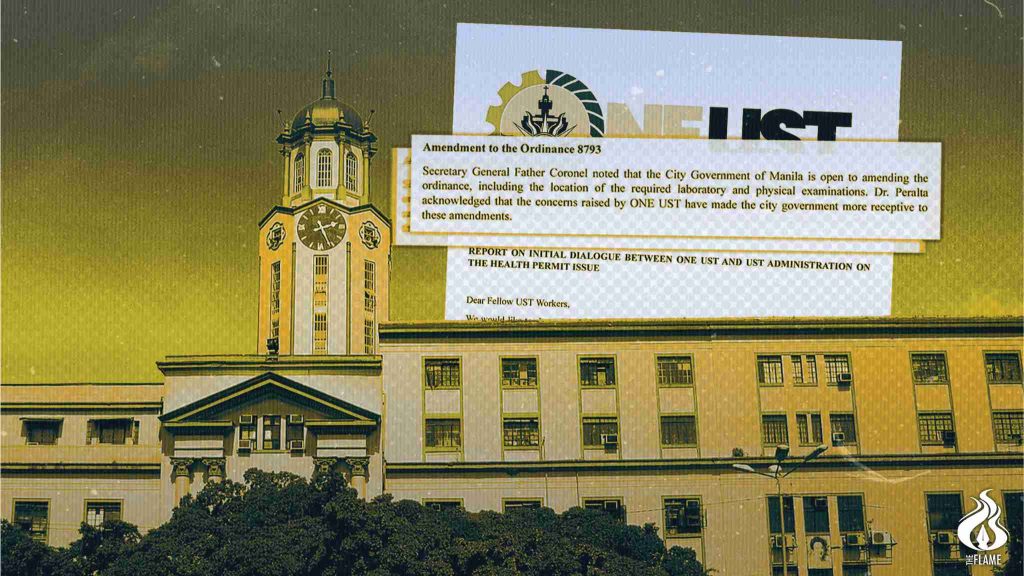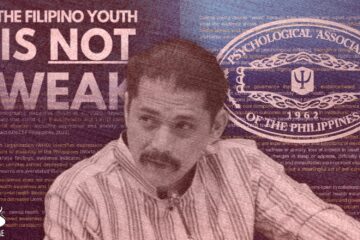
THE MANILA city government has expressed willingness to amend the controversial health permit policy, a coalition of UST labor groups said, as the policy continues to draw flak over its supposedly burdensome and discriminatory provisions.
A report released by the Organisasyon ng Nagkakaisang Empleyado-UST (ONE-UST) quoted the University administration as saying that the city government is open for revisions to Ordinance 8793, which requires all personnel to secure a health permit annually.
The concerns raised by the employees have made the city government “more receptive” to such amendments, ONE-UST said.
“Secretary General Father Coronel noted that the City Government of Manila is open to amending the ordinance, including the location of the required laboratory and physical examinations,” the report read.
The matter was raised in a dialogue last Aug. 19 between ONE-UST, a coalition of the University’s three labor groups, and the UST administration represented by Vice Rector for Academic Affairs Prof. Cheryl Peralta, Secretary General Fr. Louie Coronel, O.P., UST Hospital Director Prof. Charito Malong and UST Human Resource Director Asst. Prof. Maureen Gelle-Jimenez.
According to the report, the Manila office is considering setting up a satellite clinic in the UST Hospital in the coming year. Physical and laboratory examinations are being held at the Manila Health Department, whose facilities have been described as “inconvenient” and “unkempt” by several employees.
“UST is open to using its hospital facilities for these required health exams, which aligns with ONE UST’s position,” the coalition said.
“We also propose that the annual physical examinations for UST Hospital health workers be recognized as fulfilling the health permit requirement.”
UST Rector Fr. Richard Ang, O.P. has also expressed readiness to explore the University’s hospitalization and medical benefits or other sources to cover the health permit expenses, according to the report.
“Although the Father Rector is currently abroad, he has conveyed through Fr. Coronel his commitment to meeting with ONE UST right after his installation as Rector on September 9, 2024. We believe his leadership is essential for resolving the ‘health permit’ issue and rebuilding trust within the Thomasian community,” it said.
The costs and additional manpower in accommodating the physical examinations for the University’s 4,000 employees would also be assessed, the coalition added.
Critics of the ordinance have assailed the financial burden of obtaining a health permit, noting that employees who seek to work in the capital city must each spend P625 every year for the certificate. Meanwhile, licensed professionals may be exempted from the requirement if they opt to secure a professional tax receipt.
“ONE UST respectfully proposes that these examinations be conducted at UST at no cost to employees, under the provisions of the current CBAs, separate from the Hospitalization and Medical Benefits,” ONE-UST said.
Under Article XX Section 3 of the revised CBA, regular personnel shall receive free medical, optical and dental treatment, including annual check-ups and routine examinations such as urine and stool samples by the UST Hospital and Health Service. The provisions in the agreement, effective for five years from Aug. 1, 2021 to July 31, 2026, do not cover the University’s non-tenured or part-time employees.
While the University is considering to use its facilities as a testing site to ensure the compliance of its employees, ONE-UST reiterated its plan to resort to a legal action should Manila Mayor Honey Lacuna refuse to suspend the implementation of the ordinance.
“Our main goal is to ask Mayor Lacuna to pause the ordinance’s implementation while it is being amended. Specifically, we want the requirement for health permit of the ordinance apply only to the categories of workers defined in PD (Presidential Decree) 856,”
Under Section 15 of PD 856, all persons employed in food establishments are required to undergo physical and medical examination to secure a health certificate issued by the local health authority. The decree has no provisions for employees working in educational institutions.
The Department of Health later released the 1998 Rules and Regulations on Chapter VI-School Sanitation and Health Services of the decree, which states that “No person shall be employed in any·school without first securing a health certificate from the city/municipal health officer of the locality where the establishment is located.”
The city ordinance was raised in the Senate last Aug. 20, with Ugnayan ng mga Nagkakaisang Manggagawa-University of Santo Tomas Hospital Chair Ronald Ignacio calling for its revocation.
Ignacio raised the ordinance’s “redundant” provisions on top of the annual physical examinations required by the University, noting that other cities such as Makati and Quezon city are more lenient in the implementation of the health permit requirement. F



